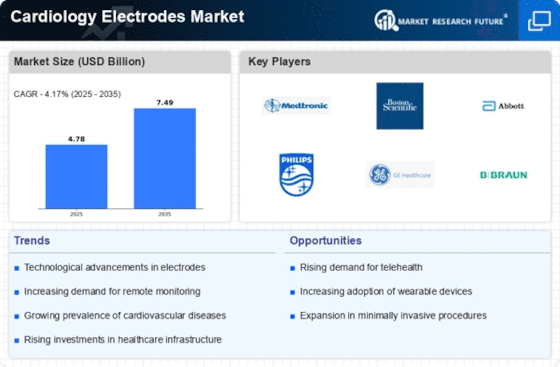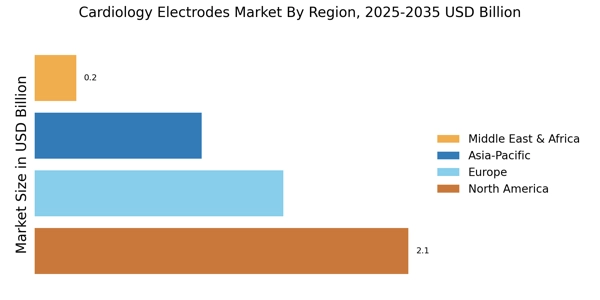Growing Awareness of Preventive Healthcare
The increasing awareness of preventive healthcare is driving demand within the Cardiology Electrodes Market. As individuals become more conscious of their health, there is a growing emphasis on regular health check-ups and early detection of potential cardiovascular issues. This trend is leading to a higher adoption rate of diagnostic tools, including cardiology electrodes, as patients seek proactive measures to monitor their heart health. Market data suggests that the preventive healthcare sector is expanding, with more individuals investing in health monitoring devices. This shift is likely to encourage manufacturers to innovate and diversify their product lines to cater to the evolving preferences of health-conscious consumers. As a result, the Cardiology Electrodes Market is expected to thrive, fueled by the increasing demand for preventive healthcare solutions.
Rising Demand for Home Healthcare Solutions
The increasing preference for home healthcare solutions is significantly influencing the Cardiology Electrodes Market. Patients are increasingly opting for remote monitoring and telehealth services, which necessitate the use of portable and user-friendly electrodes. This trend is supported by the growing aging population, which often requires continuous monitoring of cardiovascular health. Market data indicates that the demand for home healthcare devices is projected to grow substantially, leading to a corresponding rise in the need for effective cardiology electrodes. Manufacturers are responding by developing electrodes that are not only efficient but also easy to use in a home setting. This shift towards home-based care is likely to drive innovation and growth within the Cardiology Electrodes Market, as stakeholders seek to meet the needs of patients and healthcare providers alike.
Technological Innovations in Electrode Design
Technological advancements in electrode design are reshaping the Cardiology Electrodes Market. Innovations such as improved materials, miniaturization, and enhanced connectivity features are making electrodes more efficient and user-friendly. For instance, the introduction of smart electrodes that can wirelessly transmit data to healthcare providers is revolutionizing patient monitoring. This shift towards more sophisticated technology is likely to attract investments and drive market growth. Furthermore, the integration of artificial intelligence and machine learning in electrode functionality is expected to enhance diagnostic accuracy and patient care. As a result, the Cardiology Electrodes Market is poised for expansion, with manufacturers striving to stay ahead of the curve by adopting cutting-edge technologies that cater to evolving healthcare needs.
Regulatory Support for Advanced Medical Devices
Regulatory bodies are increasingly supporting the development of advanced medical devices, including those in the Cardiology Electrodes Market. This support is manifested through streamlined approval processes and incentives for innovation, which encourage manufacturers to invest in research and development. As regulations evolve to accommodate new technologies, the market is likely to experience accelerated growth. The emphasis on safety and efficacy in medical devices is also pushing companies to enhance their product offerings, ensuring that they meet stringent regulatory standards. Consequently, the Cardiology Electrodes Market stands to benefit from a favorable regulatory environment that promotes the introduction of innovative and effective electrode solutions, ultimately improving patient care and outcomes.
Increasing Prevalence of Cardiovascular Diseases
The rising incidence of cardiovascular diseases is a primary driver for the Cardiology Electrodes Market. As heart-related ailments become more prevalent, the demand for effective diagnostic and monitoring tools, including electrodes, escalates. According to recent data, cardiovascular diseases account for a substantial portion of global mortality rates, necessitating advanced medical interventions. This trend is likely to propel the market forward, as healthcare providers seek reliable solutions to enhance patient outcomes. The Cardiology Electrodes Market is expected to witness significant growth, driven by the urgent need for innovative technologies that facilitate early detection and continuous monitoring of heart conditions. Consequently, manufacturers are focusing on developing high-quality electrodes that meet the increasing demands of healthcare professionals and patients alike.

















